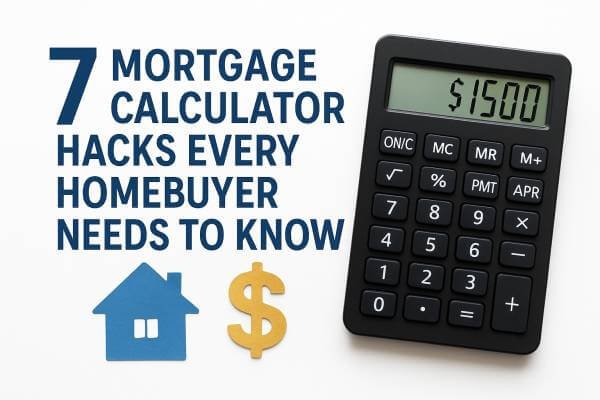7 Mortgage Calculator Hacks Every Homebuyer Needs to Know

Mortgage calculator hacks for every homebuyer aren’t just nice-to-know tips. These are truly transformative tools. Most individuals tend to concentrate solely on the monthly payment, often neglecting some incredibly beneficial features.
In reality, mortgage calculators offer much more than just estimating your monthly payments. They can help you compare loan terms, figure out how much interest you’re throwing away, and even show you how to pay off your mortgage years faster.
So, if you’re planning to buy a home or just want to make smarter money moves, you’re in the right place. In this article, we are going to walk you through 7 mortgage calculator hacks every homebuyer needs to know so you can take control of your loan, your budget, and your future.
7 Mortgage Calculator Hacks for Homebuyers
1. Go Beyond Monthly Payments
Most individuals simply enter their loan amount, interest rate, and term into a calculator to determine the monthly payment and then proceed. However, it’s important to remember that monthly mortgage payments are not the only factor to consider.
One of the smartest mortgage calculator hacks every homebuyer needs to know is this: to look at the total cost of the loan, not just what you’re paying each month. That means factoring in interest over the life of the loan, property taxes, homeowner’s insurance, PMI (if applicable), and even HOA fees if you’re buying a condo or townhome.
When you do that, you’ll get a much clearer sense of what your home will really cost you in the long run. That’s what we call true loan affordability, not just what fits in your monthly budget, but what makes sense for your future.
Use calculators that break down hidden mortgage costs so you’re not caught off guard after closing. Trust me, that extra $200/month in taxes and insurance adds up fast.
2. Play with Interest Rates
Here’s one of those mortgage calculator hacks every homebuyer needs to know: never lock in a loan without testing how small interest rate changes affect your budget. Even a 0.25% difference in interest can cost or save you thousands over the life of your mortgage.
Let’s say you’re eyeing a $350,000 home. A rate of 6.5% vs. 6.25% might only shift your monthly mortgage payment by a few bucks, but over 30 years, that adds up to serious money. The best mortgage calculators let you plug in different rates so you can run side-by-side comparisons before committing to a lender.
This step is important if you’re shopping during a volatile market or if your credit score is borderline. You might be able to qualify for a better rate or negotiate if you know exactly how much it matters.
Don’t just accept the first number you get. Play around, compare offers, and see how much you could save with even the smallest rate improvement. That’s smart mortgage planning right there.
3. Use Biweekly Payments to Cut Years Off Your Loan
Here’s one of the mortgage calculator hacks every homebuyer needs to know, and it’s wildly underrated: switching from monthly to biweekly mortgage payments.
Here’s how it works: instead of making one full payment each month, you make half a payment every two weeks. Since there are 52 weeks in a year, that means you end up making 13 full payments instead of 12. That one extra payment goes straight toward your loan principal.
Over time, this simple move can cut years off your mortgage and save you thousands in interest without feeling like a major financial stretch.
Most advanced calculators have a biweekly payment option built in. Use it to test how much faster you could pay off your home, especially if you’re looking for smart mortgage savings tips.
It’s a straightforward strategy that yields significant long-term benefits.
4. Add Extra Payments to Crush Your Loan Balance Faster
If you’ve ever dreamed of owning your home outright sooner, this one’s for you. Every homebuyer should know how to use the “extra payments” feature on a mortgage calculator to try out plans for paying off the loan early.
Over time, even small extra payments, like $100 a month, can add up to a lot. That money goes directly to your principal, which means you pay less interest overall and your loan term is shorter. Some calculators will even show you exactly how many years you’ll shave off.
It’s a wonderful way to see how small changes in your budget can lead to big long-term savings. Try plugging in different amounts, like one-time lump sums or monthly extras, and see how quickly that mortgage balance starts to drop.
This kind of planning puts you in control. No guesswork. No surprises. Its just a solid mortgage payoff strategy that works with your real-life budget.
5. Compare 15-Year vs. 30-Year Loans Side by Side
Here’s a big decision every buyer faces: Should I go with a 15-year or a 30-year mortgage? Don’t rely solely on your intuition; conduct a thorough analysis.
This mortgage calculator hack is essential for homebuyers, as it affects both the monthly payment and the total amount paid over time.
A 30-year loan gives you lower monthly payments, which feels easier on your wallet now. Should you opt for a 15-year loan instead? It usually comes with a lower interest rate and cuts your total interest in half or more.
Good calculators will show you a side-by-side comparison of loan terms: monthly payment, total interest paid, and payoff date. You’ll be able to see what’s doable for your budget and whether the savings on interest are worth the higher monthly payment.
It’s not just about how long you’re paying; it’s about how much you’re paying. Please consider the trade-offs before making a commitment.
6. Don’t Forget Taxes and Insurance
They can blow up your budget. Here’s the thing: a $1,700 mortgage payment might sound excellent until you tack on property taxes and insurance, and suddenly you’re paying $2,200.
That’s why one of the most important mortgage calculator tricks every homebuyer needs to know is to always factor in escrow costs. These are your property taxes, homeowner’s insurance, and sometimes even HOA fees, all rolled into your monthly payment by your lender.
If you skip this step, you could end up underestimating your total payment by hundreds of dollars. And that’s the kind of surprise nobody wants after closing.
Many calculators let you plug in these estimates based on your zip code or input them manually. Use that feature. It gives you a much more realistic view of your true monthly mortgage payment, not just the loan portion.
Smart buyers plan for the full picture, not just the principal and interest. Be that smart buyer.
7. See If Buying Points Makes Sense for You
Have you ever heard of mortgage points? They’re a way to buy down your interest rate upfront, basically paying more now to save more later. It seems like a wise decision. But here’s the catch: it doesn’t always pay off unless you stay in the home long enough.
That’s why this mortgage calculator hack is essential for every homebuyer to understand. The best calculators let you plug in how many points you’re buying and show how it affects your rate, monthly payment, and total loan cost over time.
You’ll be able to see how long it takes to “break even,” meaning when your upfront cost starts saving you money. If you’re only planning to stay in the home for a few years, points might not be worth it. But what if you plan to stay in the home for an extended period? You could save thousands.
Use a calculator to compare both scenarios: with and without points. That way, you’ll know if this move actually works in your favour or just eats into your cash upfront.
FAQs
1. Are mortgage calculators accurate?
Yes, mortgage calculators are usually good at giving you rough estimates. They help you figure out your monthly payments and total interest and compare different loan options. Keep in mind that the final numbers may change because of lender fees, taxes, and current rates.
2. What’s the best free mortgage calculator for homebuyers?
NerdWallet, Bankrate, and Zillow’s mortgage calculators are some of the best tools. Look for ones that have fields for taxes and insurance, extra payments, and biweekly schedules to get more accurate estimates.
3. How can I use a mortgage calculator to pay off my loan faster?
You can see how much faster you can pay off your loan and how much interest you’ll save by choosing the “extra payments” or “biweekly payment” options. Even small extra payments can cut years off the life of your mortgage.
4. Should I buy mortgage points to lower my interest rate?
It depends. Use a mortgage calculator to compare scenarios with and without points. If you’re staying in the home long-term, buying points may save you money. It might not be worth it for short-term plans.
5. Why do my estimated payments not match my lender’s quote?
Online calculators don’t always have all the information you need, like fees that are specific to a lender or real-time tax and insurance data. You can use them as a guide and then get an official loan estimate from your lender for precise numbers.























